

Politics
There's Still Hope
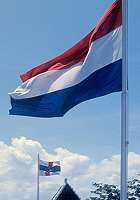
Our National Debt
& How Holland Will Reduce It:
The Gist
To put this in perspective, USA inhabitants are extremely worried (as well they might be) over their national debt, amounting ayears and years ago to over $28,358.16 per citizen and steadily growing. For us, it's $100,000 per head; 3.5 times as high.
A very uncomfortable position to be in for a country on the verge of independence.
Holland assumes debt
Holland will take over the largest part of the Netherlands Antilles' debts, reducing them to a level where yearly interest is 5% of government income. This should not be interpreted as Holland will remit those debts. As this is not without certain risks, naturally there are some conditions. These are not only financial; as was to be expected, Holland will use this leverage to obtain some conditions. In view of the experiences we have been privileged to get, not an illogical position for the Dutch government to take: The N.A. population might otherwise loose some rights we now still have.
That many of our politicians don't like this one bit almost goes without saying.
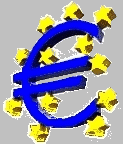
Conditions for New Loans.
There will be an Algemene Maatregel van Rijksbestuur (AmvRB) [Order of State Council] to install a Reconstruction Bank [Herstelbank], with in anticipation a temporary supervisor.
As far as we know, this is the first time since 1969 that an AMvRB has been taken, despite many requests for it by the Antillean people.
The 'temporary supervisor' will have Dutch and Antillian members. They will supervise application of financial norms; if conditions for loans are met; report to and advise State Council; and supervise implementation of new norms. New loans can only be contracted on the supervisor's approval.
After a transitional period only balanced government budgets will be accepted, with interest on loans not exceeding 5%. Curaçao and St. Maarten are only permitted to borrow from the Reconstruction Bank, with a four member board appointed by State Council.
All this will be integrated in a State Law to guarantee lasting and similar rules throughout the Kingdom.
These proposals look inspired by N.A. Central Bank director Ensley Tromp's plan.
Some More Requirements
Now, the Netherlands Antilles already share a court of justice with Aruba. The Dutch PM indicates that the Dutch government wishes to extend this to one public prosecutor, one attorney-general, one police corps and one prison system for all six islands - including Aruba. Holland as a Kingdom partner has a say in all these functions.
No doubt this arrangement has been inspired by the Curaçao announcement immediately following the referendum that the island would implement its own judicial system, in impudently plain disregard of the conditions for the referendum. In other words, they asked for it.
N.A. Political Reactions
Put in a nutshell, just like you'd expect those in power don't like all this at all. Not at all what they bargained for when they pushed us into a new unwanted referendum.
That same opposition (that once threatened with a complaint to the UN if the N.A. government interfered with them) is now pressing that same N.A. government to react to all this. But, as a matter of practical fact, the island governments will have to negotiate with the Dutch. This was the viewpoint the N.A. government presented after deliberations: They have no viewpoint and don't need one. However, dark mutterings came from individuals in coalition and opposition parties: A return to the colonial period.
- We will never give up our autonomy.
- It's unacceptable for one part of the Kingdom to force another part to accept certain rules.
(These rules apply to all parts.) Then, a week later, the NA government came out with a statement anyway; they are all for it, except that they prefer separate public prosecutors. What's the good of such heavy immediate gut reactions and then making yet another U-turn? You lose all the credibility you still had.
It will also be rather interesting to hear what the Aruban government thinks of these proposals. But don't forget, Aruba is in a bind of its own with an unsurmountable national debt, and may well be forced to eat humble pie.
That the private sector, like KKN Kamer van Koophandel [Chamber of Commerce] and Vereniging Bedrijfsleven Curaçao [Trade and Industry Union] is no less than enthusiastic was just as predictable. In a rare public statement the normally secretive Curaçao Bankers Association (CBA)declared to be pro one Central Bank system as well (banks and many other companies have subisidiaries on other islands). (According to law, KKN is a governmental institution, but they don't feel that way themselves.)
| Listen Who's Talking! |
| Monique Sint Jago, president of harbor union CBH/OVP, detests these KvK/VBC comments. She feels the citizens should not try to influence the politicians in their decision making. Really! but that is only democracy Curaçao-style; you get used to it after a while. Also, you have to know that 'her' harbor union was the original bulwark in which the infamous Godetts, say FOL, started their struggle for power - and what more comes with it. |
There is some danger that Venezuelan dictator Chavez will try to take over by assuming our debts in return for a promised independence
. Those who point this out almost seem to be wishful; they also tend to reside safely in Holland. The Chavez danger recently may have lessened considerably, with tumbling down of oil prices and presidential elections in Colombia and Perú; the fact that his economical measures
are contributing to a 9% (in 2006 grown to 11%)inflation in Venezuela will not be of much help to him either. Still, never forget: Chavez collaborates with Islam-ruled OPEC countries. Essential is, anyway, that in the referendum, such as it was, the Antillean people have clearly opted for a continued relationship with the Netherlands.It is the politicians who may have to swallow their humble pie after all.
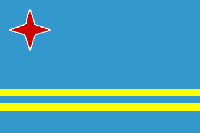
| Curaçao deputy Lak has invoked the help of Aruba PM Oduber, who was delighted to help us out in our own struggle for independence. (The people of Aruba, now like us saddled with an enormous National Debt, seem to be less pleased with Oduber than even we are with Lak.) Much to Oduber's and his political cronies' disgust, Dutch minister Pechtold reminded them of a protocol signed in 1993. You have to know that Aruba, originally pushing for complete autonomy, wised up after this had been granted and, after the first heady rush of freedom was over, made a U-turn by preferring to remain in the kingdom after all. This was graciously granted by Holland, on condition Aruba would clean up their financial and governmental mess - to which Aruba agreed. After all, paper is patient. But when Pechtold had the temerity of reminding them of the document, remarking pointedly that Aruba had not cleaned up that mess and, therefore, Holland was entitled to assume the reigns of government, Oduber and aforementioned cronies, having recovered from being absolutely stunned, exploded in Holy Wrath. They don't even want to discuss it (this we can well understand.) Minister Croes wants to help the N.A. with the Arubian expertise and experience(spare us from such help) but not at the cost of status aparte because That means War.Stalwart words, but war costs money, go ask Bush - and they have spent it all already; and then some. They feel Holland may never get a 'one-sided influence' on justice, finance and education. Seems Oduber had forgotten all about the protocol, while his delegation members mostly didn't even know it existed. Even though it has been signed and its conditions have not been met, they are of the opinion that it just does not count any more and that the agreements have expired. It cannot be good news to Aruba politicians that, more and more, the other islands seem to agree with most of the Dutch proposals. From Aruba, only RED's Rudy Lampe agreed with Pechtold's proposals. Lampe, just back from a delegation visit to Holland, needed only 3,500 of a 10,000 guilders travel allowance; in his experience it's tortureto try and give the rest back. He criticized the fact that delegation members had a business class ticket. To him, the constriction of governmment power in justice was welcome, as former minister of justice Henny Eman once ordered the attorney-general to arrest Lampe. Curaçao's politicians are getting more and more upset about Pechtold's proposals, about which he now emphasizes they are not points of discussion; which is exactly what they are planning to do. If Holland must take care of Antillean debts, Holland has demands. Meanwhile, all this bungling by Antillean politicians has already resulted in such delays that they will not be ready for the next planned round table conference. As usual, some are already blaming Holland for sabotaging this on purpose, so Holland can blame them. |
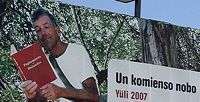
A New Beginning
for that rubbish, they still have money
Moral Power
Strictly for laughs? Some of the smallest parties, together, have written a new constitution! It's in Papiamentu! They feel the 'official' new constitution is too much based on that of Holland and doesn't sufficiently recognize Curaçao as an autonomous country. A further innovation makes clear that their thinking is less than clear: There's a Fourth Power added to the legislative, executive and judicial powers: the 'Moral Power'. It's hard to follow exactly what they want here, as it merely seems to take power away from the more customary ones. (The 'moral power' is taken from that apex of democracy, Chavez' Venezuela.) Take good note, though, that the present ombudsman's party (really! there is such a thing) is one of the initiators, and that his office would become an important part of the new power. Thankfully, not a chance of success and just a waste of hot air breath.
All this certainly tends lessens the appeal of taking your troubles to the present ombudsman's office.
2006-10-05
Let There Be Justice
An attractive suggestion came from editor Jan de Boer in Justicia [Antillean Law Magazine], entailing that analog to the 5% limit on loans there ought to be a limit on personnel, which should be guaranteed in another Rijkswet. De Boer referred to Costa Rica where 80% of government money goes to paying their servants, and to Suriname. Curaçao has more examples than we ever could really need, as well. Not to mention Aruba.
| Just Our Luck |
| End of June 2006 the Balkenende Cabinet came to a fall caused by minister Verdonk. Ironically enough, Verdonk (also known as the IJzeren Tante - no relation) was a partner in crime to Hirsi Ali, who had entered Holland for asylum under false pretences and, naturally! was welcomed to the club of politicians. Ironical, as Verdonk also had quite a reputation in the Antilles for wanting to stop legal immigration to Holland from there; but then, Antilleans tend not to be Muslims nor fanatical anti-Muslims, like Ali is. Still, it's anybody's guess what will come next, now. Especially since PAR member Mike Franco, deputy for state structure, selected (or was forced) to take his leave after four months; the fifth in three years |
Funny thing, to us: The Dutch government traditionally opens on the 3rd Tuesday of September, when the budget is always ready! The government budget statement left little to the imagination, and even less room for our politicians to wriggle out from under.
Holland feels there is insufficient understanding here that drastic measures are unavoidable, nor are our politicians willing to tackle the problem. The Dutch efforts to improve future kingdom relations by guarding against government derailments have not been accepted with a good will by the Antillean government members; but delay in tackling the Antillian problems is not acceptable.
Even though to Dutch eyes responsibility of the Antillian goverment is unsatisfactory, there is no intention of taking this over, But Holland does desire acceptance of the document Partners in het Koninkrijk [Partners in the Kingdom]. Once the Antilles have reacted positively to that proposal, planning of a new Round Table Conference can go ahead [but not before then.]
Criteria have to be agreed on for new entities as regards public finance and economy, judicial security, reliable governance, and form and content of new ties between Holland and Bonaire, Saba and St. Eustatius. All this should be achieved in 2007 as a condition for Holland's cooperation.
The Antillean situation asks for changes in governing culture and in interpretation of the government role.
I'll translate it so they will understand:
Put up or shut up.
On Dates
While some eilandsraad [island council] members feel that deliberations are stuck, new Dutch minister Nicolaï is all ready and champing at the bit for a new meeting on November 1, while the Curaçao politicians want one on November 22. (Now who's delaying?) Funnily, Holland is complaining the Antilles are not reacting to the Dutch proposals, while Curaçao claims this has been done in August, by the Antillean government. This while the island government carries motion after motion that the Antillean government has no business speaking for Curaçao.
Meanwhile, as was confidently expected by almost everybody, eilandsraad can't agree at all on an agreement. Pierrot wants those who want better contact with Holland to move to Holland; he wants to join the Caribbean and South-American revolution
(read: Castro and Chavez - others advise him to so go and live there.) Many council members do not want to remain in the Dutch sphere and are actively boycotting a possible accord; other prefer a hook-up with Venezuela.
Nicolaï also wants the matter of the three islands that want closer ties with Holland (Bonaire, Saba and St. Eustatius) arranged before Curaçao and St. Maarten get their turn.
| Let us be grateful No doubt the politicians will start with having other reactions. We can safely discount those, as they have no way out. And let us be grateful that Holland, finally, after all these Statuut years, has woken up to the obligations imposed by that document. After all, they might just as soon have figured Forget about all those debts, we'll never get a penny back anyway - Good Riddance.Instead, they came up with a formula that may mean our salvation. At least, our minister of finance de Lannooy said: We'll never get another chance like that. |
| Go Well Prepared, But Hurry |
As described in our Circus, it's no use for the 'technical commission' to leave for Holland with no accord having been reached in a meeting after which they have less than 2.5 hours left to check in for their flight. In that meeting, a decision will have to be taken on how much autonomy Curaçao will have to hand in, in return for debt sanitation.After all, the day before should (already!) have produced a St. Maarten-Curaçao accord on the central bank, and there only have to be more discussions on the public prosecutor (procureur generaal). As many of those meeters who are resolutely against this (after all, what's the use in that for them?) also have the loudest mouths, we confidently foresee fabulous fireworks. Stay tuned, however: Only 4 of the 7 commission members were present at that meeting: They want their own police, their own PG and 100% debt sanitation. And there still is no agreement on the monetary union of St. Martin and Curaçao. FOL is even coming out with statements that, with the referendum, the peoplehave chosen for a separate Curaçao bank. But that FOL can't read we knew already; the 'Referendum Bulletins' describe another viewpoint. |
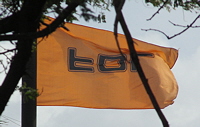
Much Ado About Nothing?
Curaçao, St. Maarten and the country of Holland agreed, on 2 October 2006, on a new political structure, accepting virtually all points as proposed by Holland. The Dutch found a way to satisfy both islands' wishes for their own public prosecutors and police, by tightening kingdom's controls on those.
The Curaçao island government seems once to have accepted a motion that the results of these deliberations will have to be voted for by the population in yet another referendum (sigh...), and the St. Maarten delegation uttered some vague remark that can be explained similarly.
It's funny enough that St. Maarten had to go along, even though it technically has no debts of its own: All country debts would be taken over by Curaçao island; now (not in July 2007) by the Kingdom of the Netherlands. Which last detail can only mean that, as from today, budgets will really have to be balanced. Somehow.
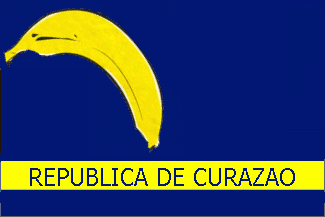
The Ants' Nest Has been Stirred—And We'll Get Stung
But that joke may be on them, as a telephone poll showed MAN, the biggest protestors, would lose most votes, while most of their own voters oppose MAN's position. The banks already stated that they will not lend the island one more cent, while supermarkets and importers made clear that they will stop all further deliveries to the government if the final agreement is not accepted. Trade unions, chamber of commerce and the government's own dept. for juridical advise all advise the document should be accepted as-is. 64% of the voters agree, but the politicians called all these pronouncements
blackmail—listen who's talking.
With a 200-person demonstration outside the building against the document, eilandsraad started by wasting five hours trying for Godett to be present—but justice minister Dick did not allow it, not even shackled, manacled and muzzled. 'They' must have been too busy, but there was a plan to introduce a law, in October, where a convicted crook couldn't be a member of parliament or island government any more. Hear, hear: Dennis Evertsz (PNP) stated
juridical rules of the country should not be transgressedwhile Errol Cova felt
existing rules should not be abused; how like him—if a law doesn't agree with you, just disregard it.
Back in the USSR [1919]:Finally, only PAR and PNP voted for accordation: With 7 against 13 votes we were thrown back to 1990, only with much more debts and still less of a future. Criminally stupid shortsighted stubbornness. The only good thing about all this is that the government must be replaced, giving deputies much less opportunities to make shady deals with, for example, PdVSA in the meantime. MANcaay refused to accept that consequence, but Dutch minister Nicolaï snapped right back that he will not be renegotiating, and forget all about taking over of debts - so there. Anyway, PAR beat the brave MANcaays to it by retracting their own coalition support and announcing they and PNP would not return in the island government without new elections. If banks and suppliers are serious about their threats, that whole sorry excuse we have left for a government may just totally collapse in less than two weeks (that'd be just in time to give me a nice birthday present!)—even if they could get an act together, after a fashion. Pierrot, showing his pettiness, said it's PAR's own fault,
Sverdlovalso also said:It is very good that the legislative and executive power are not divided by a thick wall as they are in the West. All problems can be decided quickly.Especially on the phone.
Alexander Solzhenitsyn, The Gulag Archipelago, page 307
as they presented it as a political victory and you can't expect other parties to accept that.Yes, it's a quote.
MAN's Charles Cooper does not understand
why PAR gets out of island government.He must be even dumber than we figured he was. If he really means that, yeah, I know. Even then.
Let us also remember that on October 13 all those guys claimed to have reached a joint viewpoint. And that some have stated repeatedly they want to hook up with Venezuela.
All that while Venezuela-Chavez' jet fighters have started bugging Curaçao-based Dutch F60 aircraft. Such exquisitely delicate timing...
2006-11-28/9
All this brouhaha, just when it seemed almost over
it just goes on and on
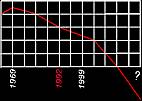 |
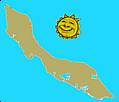 |
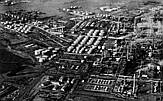 |
| economy | geography climate |
tourism |


Curaçao Island live in real time
SEARCH this site or the Web

copyright notice
all material on this site, except where noted
copyright © by , curaçao
reproduction in any form for any purpose is prohibited
without prior consent in writing